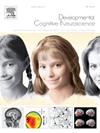认知与儿童后期任务相关的大脑网络重构有关
IF 4.9
2区 医学
Q1 NEUROSCIENCES
引用次数: 0
摘要
为了在休息状态和执行认知要求的过程之间转换,大脑对其网络组织进行了一系列微妙的改变。在成年人中,较少的重新配置与更好的任务表现有关,这表明在休息时预先配置的大脑组织是有益的,这样只需要微小的改变就可以执行任务需求。在这里,我们从发展的角度来看待这一现象,通过利用青少年大脑和认知发展研究中9-11岁儿童的大量样本来检查儿童后期的重新配置。我们发现静息状态和两个执行功能任务之间的重构越多,任务表现越好。即使考虑到网络隔离,这些关系仍然成立,尽管隔离与重新配置负相关。重构也与结晶智力有关,在不同的任务中有不同的影响。总的来说,这些发现表明,与儿童期后期的成年期相比,在大脑功能网络完全成熟之前,更大的重构促进了成功的任务表现。本文章由计算机程序翻译,如有差异,请以英文原文为准。
Cognition is associated with task-related brain network reconfiguration in late childhood
In order to transition between a resting state and carrying out cognitively-demanding processes the brain makes a host of subtle changes to its network organization. In adults, less reconfiguration relates to better task performance, suggesting a preconfigured brain organization at rest is beneficial, such that only minute changes are required to execute task demands. Here, we take a developmental lens to this phenomenon, examining reconfiguration in late childhood by leveraging a large sample of 9–11 year olds from the Adolescent Brain and Cognitive Development Study. We find more reconfiguration between the resting state and two executive function tasks is related to better task performance. These relationships hold even when accounting for network segregation, though segregation was negatively related to reconfiguration. Reconfiguration was also related to crystallized intelligence, with diverging effects across tasks. Overall, these findings demonstrate that in contrast to adulthood during late childhood, before functional brain networks are fully mature, greater reconfiguration promotes successful task performance.
求助全文
通过发布文献求助,成功后即可免费获取论文全文。
去求助
来源期刊

Developmental Cognitive Neuroscience
NEUROSCIENCES-
CiteScore
7.60
自引率
10.60%
发文量
124
审稿时长
6-12 weeks
期刊介绍:
The journal publishes theoretical and research papers on cognitive brain development, from infancy through childhood and adolescence and into adulthood. It covers neurocognitive development and neurocognitive processing in both typical and atypical development, including social and affective aspects. Appropriate methodologies for the journal include, but are not limited to, functional neuroimaging (fMRI and MEG), electrophysiology (EEG and ERP), NIRS and transcranial magnetic stimulation, as well as other basic neuroscience approaches using cellular and animal models that directly address cognitive brain development, patient studies, case studies, post-mortem studies and pharmacological studies.
 求助内容:
求助内容: 应助结果提醒方式:
应助结果提醒方式:


